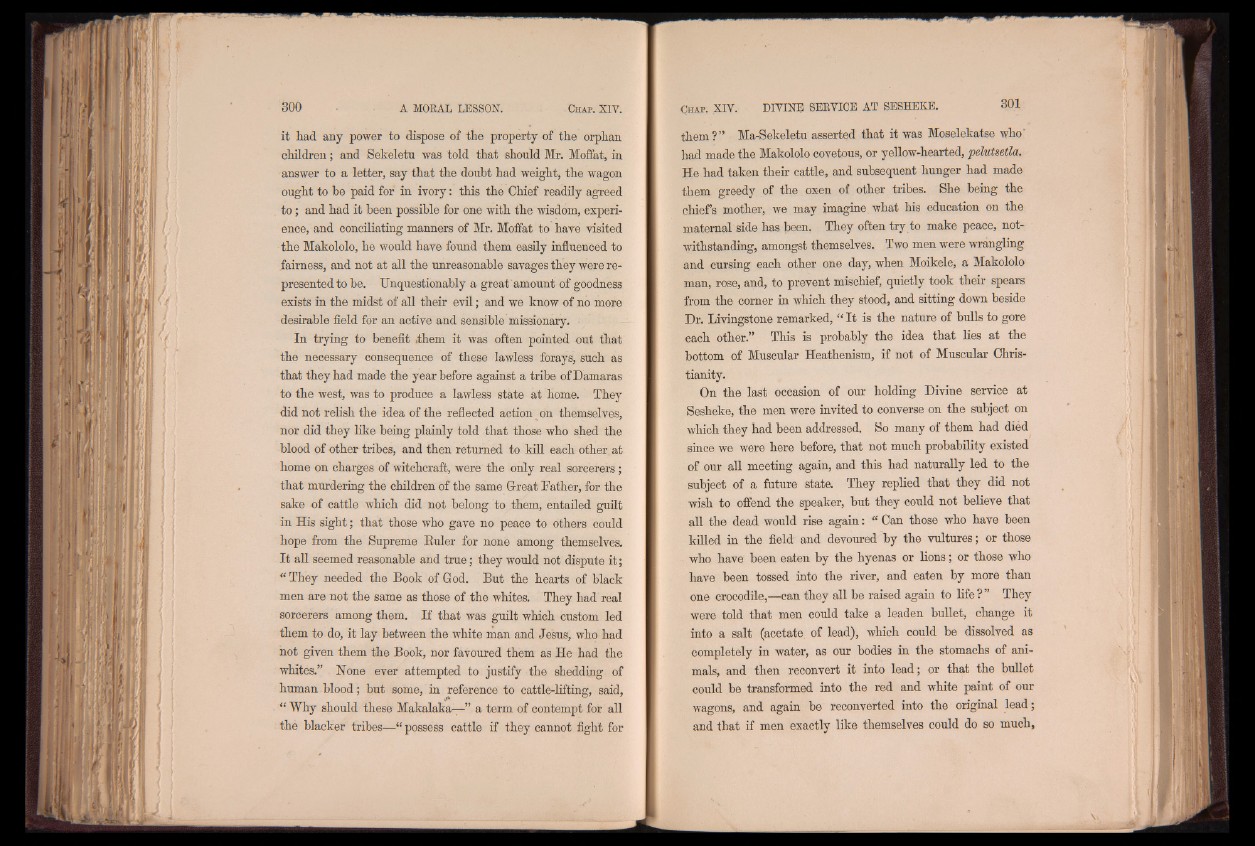
it had any power to dispose of the property of the orphan
children; and Sekeletu was told that should Mr. Moffat, in
answer to a letter, say that the doubt had weight, the wagon
ought to be paid for in ivory: this the Chief readily agreed
to ; and had it been possible for one with the wisdom, experience,
and Conciliating manners of Mr. Moffat to have visited
the Makololo, he would have found them easily influenced to
fairness, and not at all the unreasonable Savages they were represented
to he. Unquestionably a great amount of goodness
exists in the midst of all their evil; and we know of no more
desirable field for an active and sensible missionary.
In trying to benefit .them it was often pointed out that
the necessary consequence of these lawless forays, such as
that they had made the year before against a tribe ofDamaras
to the west, was to produce a lawless state at home. They
did not relish the idea of the reflected action on themselves,
nor did they like being plainly told that those who shed the
blood of other tribes, and then returned to kill each other, at
home on charges of witchcraft, were the only real sorcerers;
that murdering the children of the same Great Father, for the
sake of cattle which did not belong to them, entailed guilt
in His sight; that those who gave no peace to others could
hope from the Supreme Euler for none among themselves.
I t all seemed reasonable and true; they would not dispute it;
“ They needed the Book of God. But the hearts of black
men are not the same as those of the whites. They had real
sorcerers among them. If that was guilt which custom led
them to do, it lay between the white man and Jesus, who had
not given them the Book, nor favoured them as He had the
whites.” None ever attempted to justify the shedding of
human blood; but some, in reference to cattle-lifting, said,
“ Why should these Makalaba—” a term of contempt for all
the blacker tribes—“ possess cattle if they cannot fight for
them ?” Ma-Sekeletu asserted that it was Moselekatse who'
had made the Makololo covetous, or yellow-hearted, pelutsetla.
He had taken their cattle, and subsequent hunger had made
them greedy of the oxen of other tribes. She being the
chief’s mother, we may imagine what his education on the
maternal side has been, They often try to make peace, notwithstanding,
amongst themselves. Two men were wrangling
and cursing each other one day, when Moikele, a Makololo
man, rose, and, to prevent mischief, quietly took their spears
from the comer in which they stood, and sitting down beside
Dr. Livingstone remarked, “ I t is the nature of bulls to gore
each other.” This is probably the idea that lies at the
bottom of Muscular Heathenism, if not of Muscular Christianity.
On the last occasion of our holding Divine service at
Sesheke, the men were invited to converse on the subject on
which they had been addressed. So many of them had died
since we were here before, that not much probability existed
of our all meeting again, and this had naturally led to the
subject of a future state. They replied that they did not
wish to offend the speaker, but they could not believe that
all the dead would rise again: * Can those who have been
killed in the field and devoured by the vultures; or those
who have been eaten by the hyenas or lions; or those who
have been tossed into the river, and eaten by more than
one crocodile,—can they all be raised again to life ? ” They
were told that men could take a leaden bullet, change it
into a salt (acetate, of lead), which could be dissolved as
completely in water, as our bodies in the stomachs of animals,
and then reconvert it into lead; or that the bullet
could be transformed into the red and white paint of our
wagons, and again be reconverted into the original lead;
and that if men exactly like themselves could do so much,